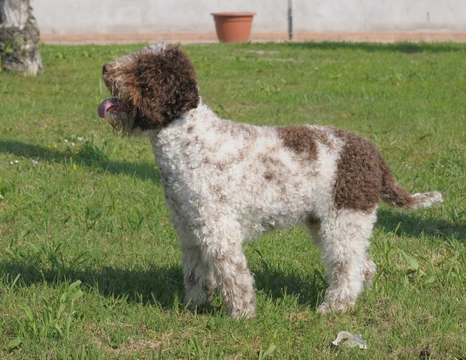
More information on the Lagotto Romagnolo dog breed
The Lagotto Romagnolo is also sometimes known as the Romagna Water Dog or Water Dog of Romagna, and is native to the area of Romagna in Italy. Traditionally used as a retrieving gun dog and a general working dog, today the Lagotto is the only breed of dog that is widely used to hunt for truffles, expensive fungus-based delicacies that grow around the bases of trees in some regions.
One of the oldest known breeds of water retrievers, it is thought that all other breeds of water retrieving dogs have the Lagotto Romagnolo partially to thank for their ancestry, and the breed is incredibly popular today both within Italy and further afield. They are not yet present within the UK in large numbers, but as word of the Lagotto Romagnolo spreads and more and more dogs of the breed are exported year on year, they are becoming ever more widely known.
If you are wondering if the Lagotto Romagnolo is the right choice of dog for you, in this article we will cover some of the most frequently asked questions about the breed as a whole. Read on to learn more.
What is the temperament of the Lagotto Romagnolo?
The Lagotto Romagnolo is first and foremost a working dog, and they have a very business-like attitude to their lives in general! They thrive on having a job to do and utilise their sharp senses of sight, hearing and smell to assist them in their roles, but they can also make for great pets for families who have plenty of time to devote to keeping them occupied!
They are loving dogs that tend to remain loyal to their families, and are very affectionate and personable as well as generally being quiet within the home. The superior sense of smell and strong working instincts of the Lagotto makes them an excellent truffle searching dog, and provides the added advantage over the traditional truffle pigs that they are not prone to eating their finds when they come upon them!
Due to the value of better quality truffles, Lagotto Romagnolo dogs with good truffle hunting instincts are very highly prized, and respected throughout the world for their abilities. Partially due to their working histories and also the usual canine behavioural traits, the Lagotto is also a keen digger, and will soon dig up the garden or flower beds if you do not provide them with a sand pit or their own area of the garden that they can play in!
Do they require much exercise?
The Lagotto Romagnolo is an active, lively dog that is bright and intelligent and tends to become easily bored. They like to have plenty of variety in their walks, and also to be able to have the opportunity to run off the lead regularly too. They are often, but not always, keen swimmers, and will generally enjoy playing in ponds and streams.
A varied, active exercise schedule is vital to keep a Lagotto happy within the domestic home.
Are they easy to train?
The Lagotto is intelligent and amenable to training, and performs best in roles that allow them to utilise their keen senses and keep moving. They are generally keen to please and willing to work hard and learn new skills, and like to have variety as part of their daily lives and general training routines.
Are their coats high maintenance?
There is no general consensus on how to best care for the curly, thick coat of the Lagotto, with some schools of thought stating that the coat should be left alone, while others insist that the breed requires regular grooming.
The coat does have a tendency to become matted in places, which requires separating by hand, but the breed is generally classed as low shedding and not difficult to keep in good condition.
Do they get on well with other animals?
Good socialisation is vital for all puppies to ensure that they learn how to interact with other dogs when they are older, and assuming that this is achieved, the Lagotto is usually highly social and friendly with other dogs.
While they do have strong working instincts and work well at retrieving and hunting, they are not unduly threatening to smaller pets and wildlife, and do not have a prey drive equivalent to that of many other working hunting breeds.
They can live happily with cats generally speaking, providing again that they are introduced and managed well during the early stages.
Do they get on well with children?
Lagotto Romagnolos that are bred from pet stock tend to be well used to life within a domestic, rather than a working environment, and are generally incredibly personable, open and honest in their interactions with people. They generally get on well with kids of all ages, although every dog should be considered on its individual merits and not generalised under their particular breed umbrella. They like to play and keep active, and will usually enjoy games with children, such as playing ball or running around.



